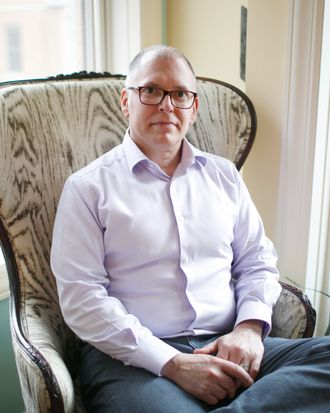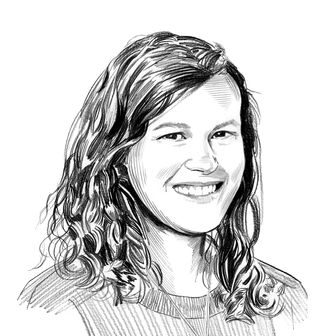
The Supreme Court is expected to announce its ruling on Obergefell v. Hodges — the group of cases that could determine the constitutionality of marriage for same-sex couples — later this month. Most legal experts expect the court to rule in favor of same-sex couples’ rights — and, until the decision is announced, the case’s lead plaintiff, Jim Obergefell, will sit in court every day to hear the rulings. “Sitting in the courtroom on Monday was the first time since the Supreme Court accepted our case that I started getting nervous,” he told the Cut last night at a reception hosted by the New York Civil Liberties Union. “I’m still nervous, and I think I’m getting more nervous every minute.”
Obergefell’s story is a tragic one. He and his late husband, John Arthur, were together for more than 20 years, but didn’t decide to get married until 2013, after the Supreme Court struck down the Defense of Marriage Act. At the time, Arthur was terminally ill with ALS. The couple could not get married in their home state, Ohio, where marriage for same-sex couples is still not legal, but with the help of family and friends they were able to charter a medical jet to Baltimore, Maryland — where they were married in the plane, on the tarmac. When they arrived home in Cincinnati, however, they learned that Ohio would not recognize their marriage — meaning that, when Arthur died, Obergefell’s name would not be listed as his spouse on his death certificate.
The couple filed a lawsuit against the state, and a federal judge granted their motion; when Arthur died later that year, Obergefell was listed as his spouse on the death certificate. However, Ohio officials appealed the ruling — leading to a string of appeals that have landed in the Supreme Court. Ohio has said it will issue an amended death certificate if the SCOTUS rules in its favor.
Last night, honored by the ACLU and NYCLU LGBT and AIDS Project, Obergefell told his story in front of a room of New York lawyers, as well as Edie Windsor, the lead plaintiff from the 2013 Supreme Court DOMA ruling. The atmosphere in the room felt hopeful and historic, and, from the audience, Windsor delivered a message: “We have to stop using the term ‘same-sex marriage.’ It’s marriage. It’s about marriage. It’s about dignity. It’s about equality.”
The Cut spoke with Obergefell about how it feels to the man behind the landmark case.
What has your experience been like watching this case move forward?
The thing that I think of the most, that I will remember the most from this experience, is how much people across the country respond to our story. Our story resonates with people, and I’ve had so many people just come up to me and thank me, give me their condolences, hug me, tell me stories. It’s really been amazing to learn just how much people are behind us, and how many people believe in equality and want us to win.
What kinds of things have you heard from supporters?
A young man recently came up and introduced himself, and then told me that John’s and my story, and watching the video of our wedding, gave him the courage to come out. A mother came up to me and told me that her daughter had just come out that morning, and they were at an event where I was speaking, and she thanked me, because listening to me speak, they both cried, but it made them feel hopeful. It’s just constant. People tell me about someone they love, and how they want that person to be able to marry, or people who’ve been together for 20, 30 years, and they’re engaged, but they’re not married yet because they want the same thing John and I wanted — to be respected, and to have our marriage recognized.
What does marriage, and the right to marry, mean to you personally?
To me personally, it means that my relationship with the person I love, the person I committed to, the person I would and did do everything and anything for, is a relationship that’s worthy of respect and recognition. And to know that it can’t simply be erased by my state, and that the state of Ohio can’t pretend that our 20 years together never existed. So for me, marriage is that commitment — the public commitment to each other, and to the government, that we love each other, and we’re committed to each other. To me, that’s what marriage is.
You’ve said before that you didn’t used to consider yourself an activist. Would you say that’s changed?
That has changed, absolutely. With this ruling coming out, and even if the ruling is what we’re hoping for, I know I’m not done. Even though my case will have ended, and there will be marriage equality coast to coast, there’s still so much more to do for the LGBT community. I mean, across the country, even being able to marry, couples will lose their jobs, lose their homes, because they’re gay or bisexual or transgender. And that isn’t right. I have discovered my internal activist, and I have to keep fighting. It’s too important to me now to say, Okay, marriage equality is done, I’m going to go back to my normal life. This has become my normal life.
What do you think the next steps for LGBT equality are?
I think it is at a local, state, and federal level, fighting for nondiscrimination policies and laws. That’s the next big step.
How have you seen attitudes toward the LGBT community change over the past ten, 20 years?
Oh, it’s dramatic. I’ll explain that just in the context of Cincinnati. In the mid-’90s, Cincinnati passed a charter amendment so that no laws could be passed to protect the LGBT community. So for about a decade after that, it was one of the most unfriendly places for the LGBT community. But since then, it’s been repealed, we have an openly gay councilmember, the city has passed laws and implemented policies to protect the LGBT community, and to provide benefits. The city of Cincinnati was named as a defendant when we filed our suit. The city solicitors stood up in court and said, “Your honor, the city of Cincinnati agrees with the plaintiffs. We will not fight that.” So for me that’s been the very dramatic, at-home example of how attitudes have changed. And everywhere I go across the country, people have been telling me how they’ve experienced changes in their communities. Friends have told me that knowing me, and watching my fight for my marriage, has changed their opinions. So, it happens all over the place.
How does it feel to be associated with such a landmark case?
It doesn’t seem possible. I mean, on one hand, it’s incredible to think that my name, John’s and my story, is a landmark case that will be in history books. That’s an incredible thing, on an intellectual level. It’s the emotional level where I’m still catching up to that. It just doesn’t seem possible, and it doesn’t seem at all possible that I’m the person at the center of it. Knowing that I wasn’t an activist, and knowing that it all started just because John and I loved each other.
This interview has been edited and condensed.





